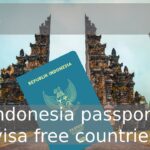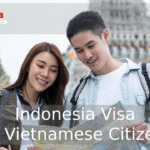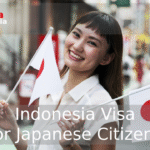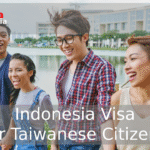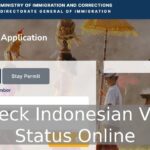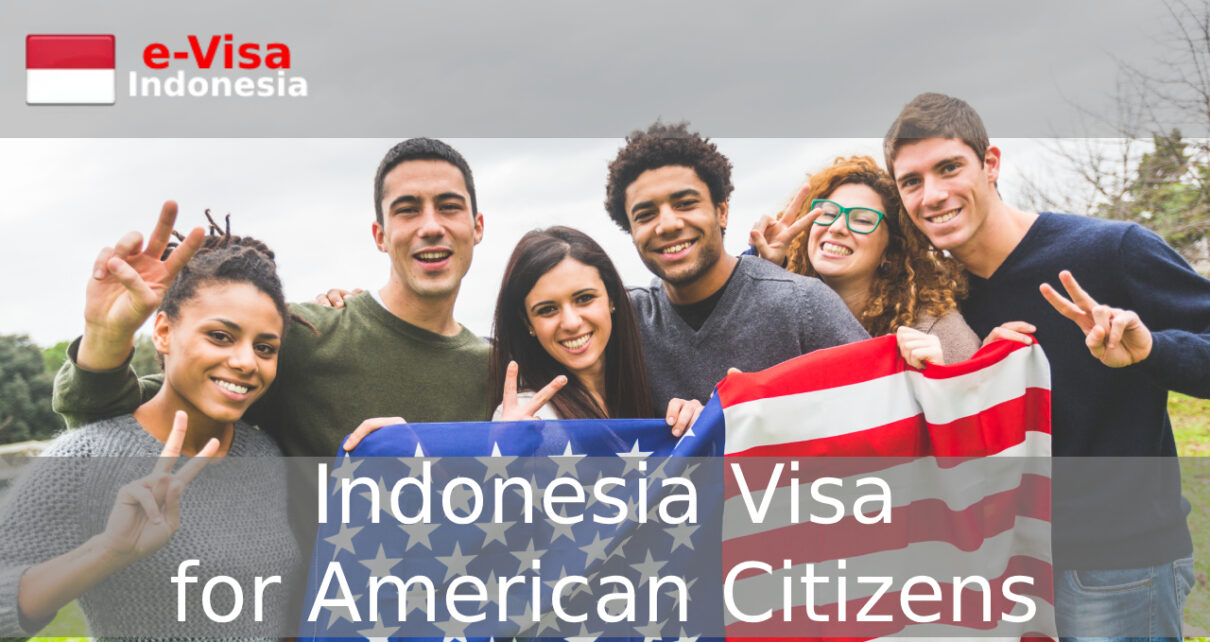
American citizens traveling to Indonesia need a visa, but the type depends on the purpose and duration of the visit.
For short-term stays, such as tourism, leisure, or family meetings, US nationals have two convenient options to choose from depending on their specific needs and preferences: the Visa on Arrival (also known as VOA, B1) and the Single-Entry Tourist Visa (C1).
For longer stays or visits with purposes such as business, study, or work, Americans can apply for other types of an Indonesia visa. They often require additional documentation and approval, but the entire application process is available online, making it more convenient than ever.
Regardless of the type, US travelers must make sure their passport is valid for at least 6 months from the date of entry, as this is a crucial requirement for crossing the borders.
NOTE: It’s essential to stay updated on Indonesia’s visa policies, as conditions and processes may change.
Types of Indonesian Visas Available for US Citizens
Indonesia provides a variety of visa options that suit different travel purposes for American citizens.
These include categories such as general, family, or social visits; investment, business, or government-related travel; golden visas; diaspora visas; silver hair and retirement visas; second home visas; professional or employment visas, and others.
Tourist Visas
For Americans traveling to Indonesia for leisure, the most popular options are the Visa on Arrival (VOA) B1 and the Tourist Single-Entry Visitor Visa C1, while D1 and F1 Visas are also available.
The Visa on Arrival (B1) is suitable for short-term visits, including recreation, personal development, business meetings, negotiations, field observations, medical-related activities, or visiting family and friends.
It allows a stay of one month, with the opportunity to extend for an additional 30 days. US visits will need to provide a passport valid for at least 6 months and an outbound ticket from Indonesia.
The Tourist Single-Entry Visitor Visa (C1) is ideal for longer stays, allowing up to 60 days with a 30-day extension option.
It is designed for tourism, social visits, or participation in non-commercial events such as sightseeing, family gatherings, or conventions.
Key requirements include a passport that doesn’t expire for 6 months, a bank statement showing a minimum balance of USD $2000, and a recent face photo.
Other Visa Types
Government & Business Visas are issued for official state visits, business meetings, investment planning, and corporate events. These visas do not authorize permanent employment in Indonesia.
For example:
- B4 – Government Business Visa on Arrival
- C2 – General Business Visa
- C10 – Business Event Visa
Crew Visas are issued to foreign nationals working as crew members on ships, aircraft, or other international transport entering Indonesian territory.
For example:
- A36 – Crew Visa Exemption
- A37 – Additional Crew Visa Exemption
- C13 – Foreign Crew Visa
Work & Training Visas are issued to foreigners participating in temporary employment, specialized projects, filmmaking, or professional training programs in Indonesia.
For example:
- C16 – Training Visa for Invited Experts
- C22 – Internship Visa
- E35 – Work and Tour Visa
Study & Education Visas are issued to students, researchers, and academic participants involved in formal education, short courses, or scientific research.
For example:
- E30A – Student Visa
- C9 – Study & Training Visa
- C9B – Indonesian Language Course Visa
Family Visas are issued to foreign nationals joining or reuniting with their Indonesian spouse, children, or parents residing in the country.
For example:
- E31A – General Family Visa
- E31C – Visa for Children of Indonesian Nationals
- E31G – Visa for Parents of Indonesian Citizens
Former Indonesian Citizen Visas are issued to ex-citizens and their immediate family members, making it easier to return or stay in Indonesia long term.
For example:
- E32A – Visa for Former Citizens
- E32B – Visa for First & Second-Degree Relatives
- E32C – Former Citizen Visa (Up to 2 Years)
Investment Visas are issued to foreign investors intending to establish or expand businesses, companies, or branch offices in Indonesia.
For example:
- E28A – General Investment Visa
- E28B – Visa for Company Establishment
- E28C – Visa for Non-Corporate Ventures
Long-Term & Special Stay Visas are issued to individuals such as retirees, remote professionals, and those with specialized skills. These do not permit permanent employment.
For example:
- E33 – Second Home Visa
- E33E – Retirement Visa
- E33G – Remote Worker Visa
Medical Visas are issued to foreigners seeking medical care or undergoing treatment in Indonesia. Some are short-term, while others allow longer medical stays.
For example:
- C3 – Medical Treatment Visa
- D3 – Extended Medical Visa
- E33G – Long-Term Medical Stay Visa
Culture, Arts & Media Visas are issued to individuals involved in cultural exchanges, artistic performances, press coverage, or film/media production.
For example:
- C5 – Media & Press Visa
- C7 – Cultural Activity Visa
- C7A – Music Performance Visa
Sports Visas are issued to athletes, coaches, and officials participating in sports competitions, events, or training programs in Indonesia.
For example:
- C8A – Athlete Visa
- C8B – Sports Official Visa
- D8A – Extended Stay Visa for Athletes
Other Special Visas are issued for unique purposes such as court proceedings, religious missions, audits, inspections, and after-sales technical services.
For example:
- C21 – Judicial Process Visa
- C10A – Religious Mission Visa (Preacher)
- C17 – Business Audit & Technical Inspection Visa
Documents Required for a Visa to Indonesia
US nationals heading to Indonesia should be aware of the visa documentation requirements for a smooth application process, especially for longer stays.
What is needed for all Indonesian visa types:
- Passport: A US passport that’s valid for at least 6 months from the date of arrival is mandatory. Make sure it has at least one blank page for the visa stamp.
- Photograph: A recent face photo, typically with a white background, may be needed depending on the visa category.
Depending on the purpose of the visit:
- Tourism: A confirmed return or onward ticket and hotel reservation may be requested.
- Business trips: A letter of invitation from an Indonesian organization is commonly required.
- Employment: A formal job offer or employment contract from a registered Indonesian employer is necessary.
- Study purposes: Applicants should include proof of enrollment from an Indonesian academic institution.
Having all documents ready helps prevent last-minute complications and maximizes chances for successful approval.
How to Apply for an Indonesian Visa
US citizens can get an Indonesian visa online through official eVisa system, which streamlines the application process for various visa types.
Here’s how the process typically works (shown on the example of the C1 Visa):
- Visit the official eVisa website by going to https://evisa.imigrasi.go.id/ and clicking the “Apply” button.
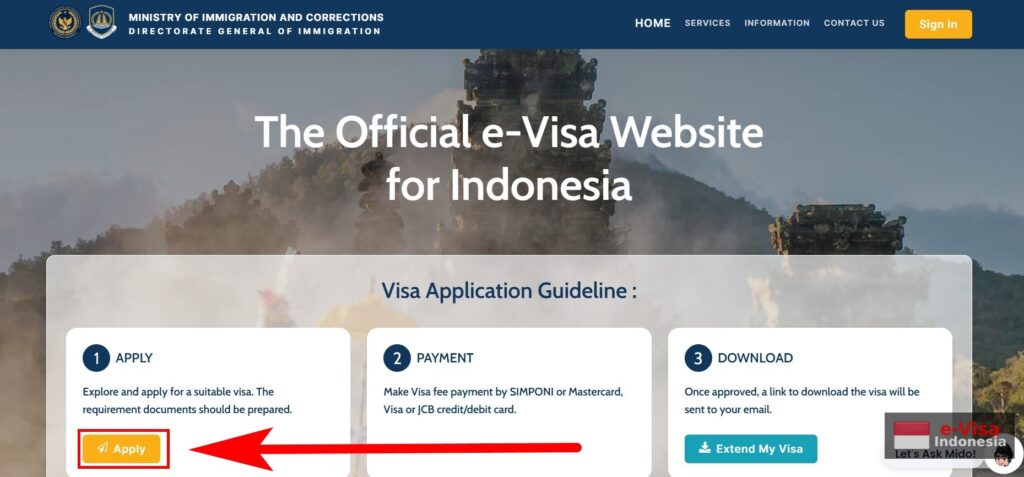
- Select your passport-issuing country from the dropdown list provided.
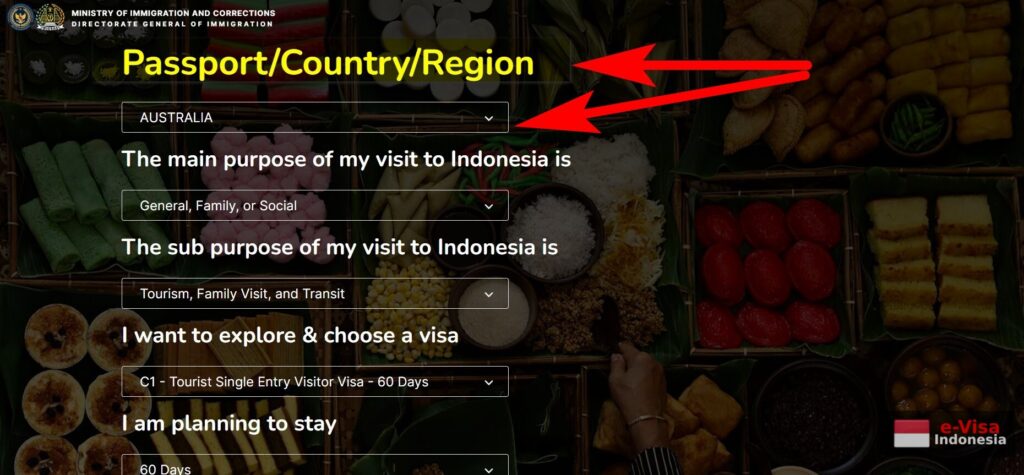
- Choose the primary purpose of your visit by selecting one of the categories listed on the page.
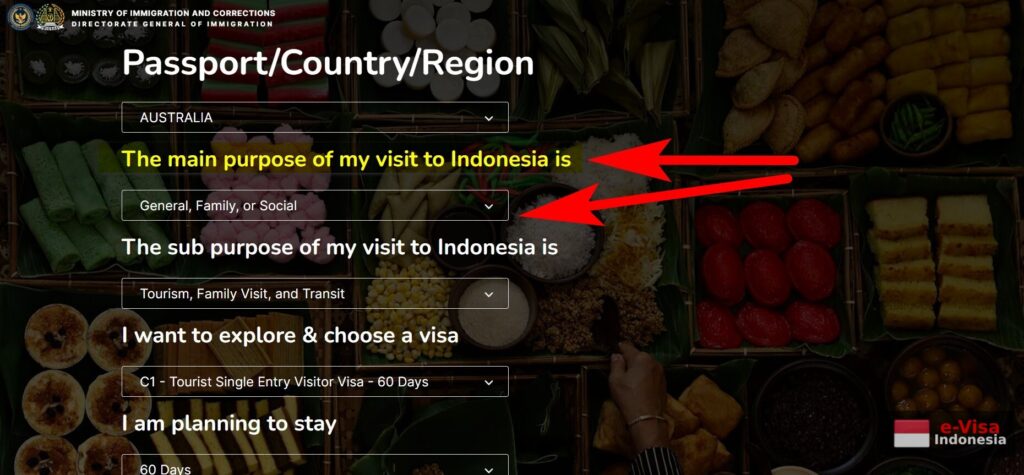
- Specify the sub-purpose of your visit to provide more detailed information about your travel intentions.
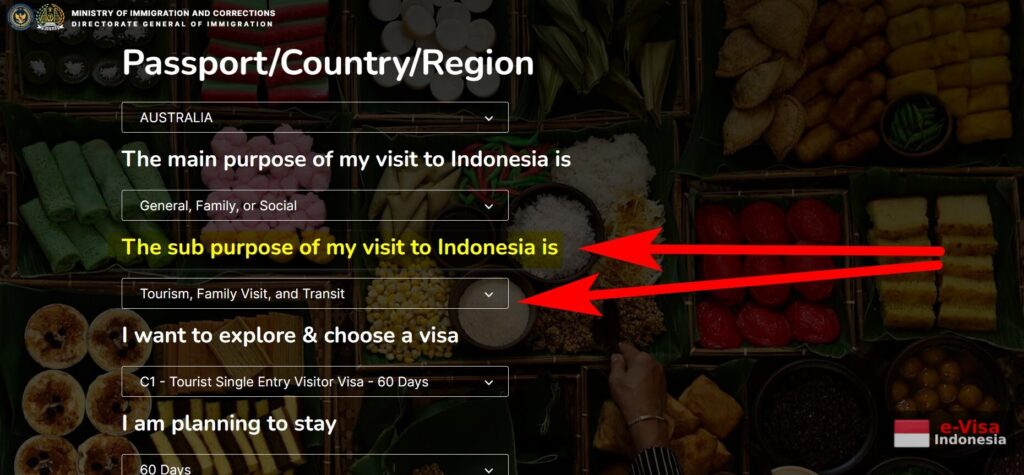
- Select the appropriate visa type based on the purpose and sub-purpose you’ve chosen.
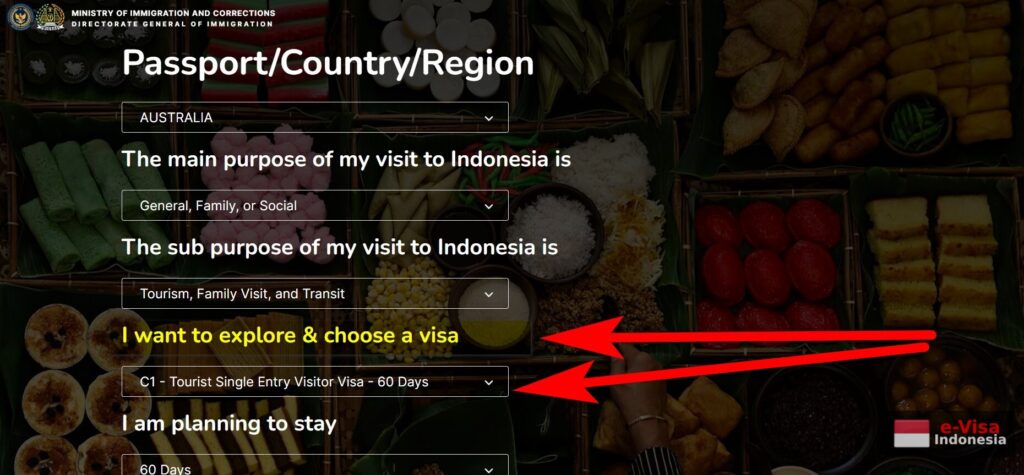
- Indicate your intended length of stay by choosing a suitable duration.
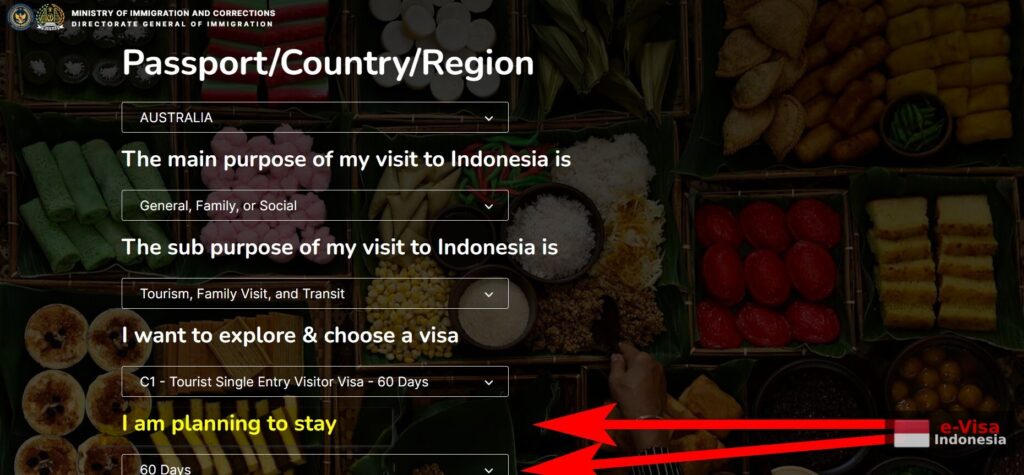
- Click on “Detail and login” to move forward to the next part of the process.
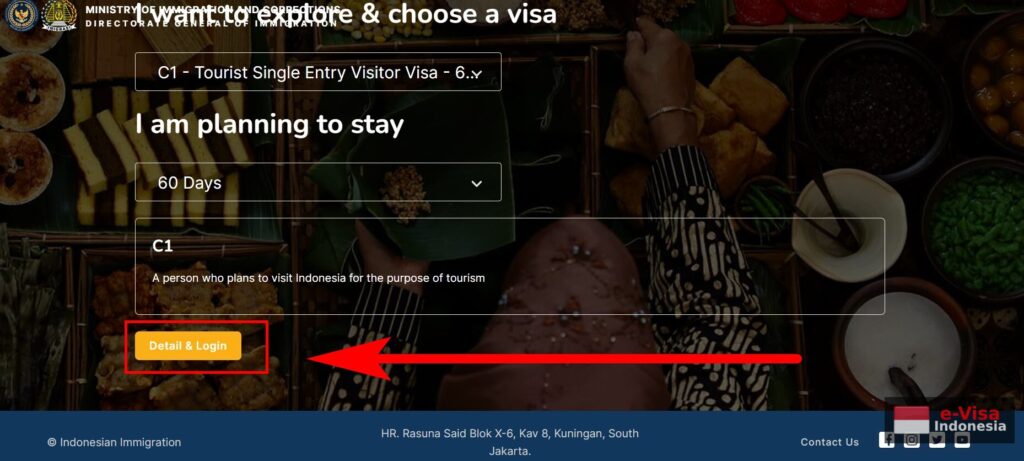
- Review all visa-related information carefully, then click “Apply” to proceed with your application.
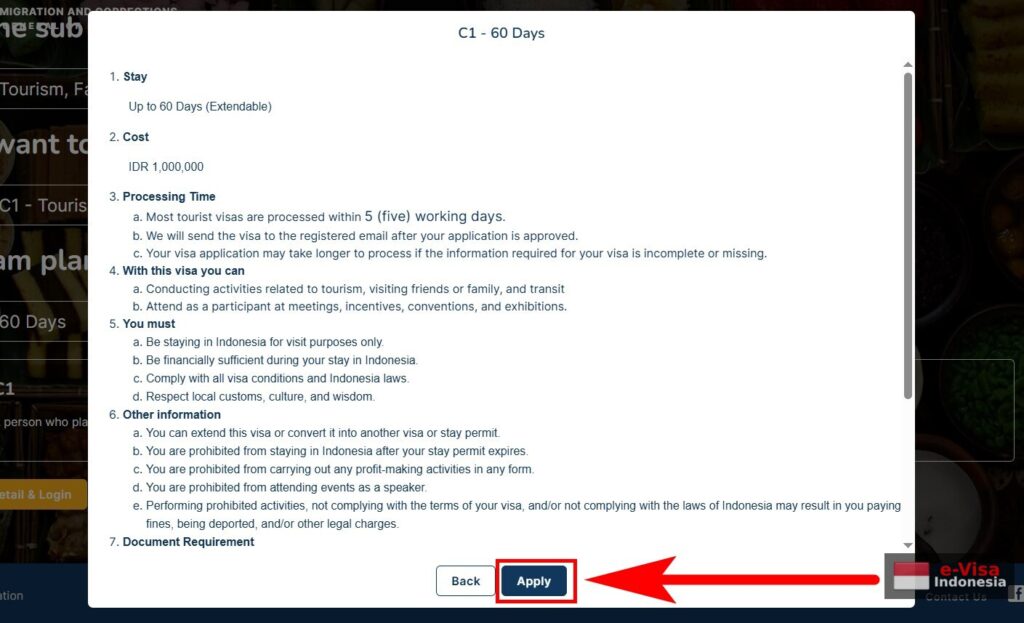
- Confirm that you are applying as an individual (not on behalf of a guarantor or sponsor).
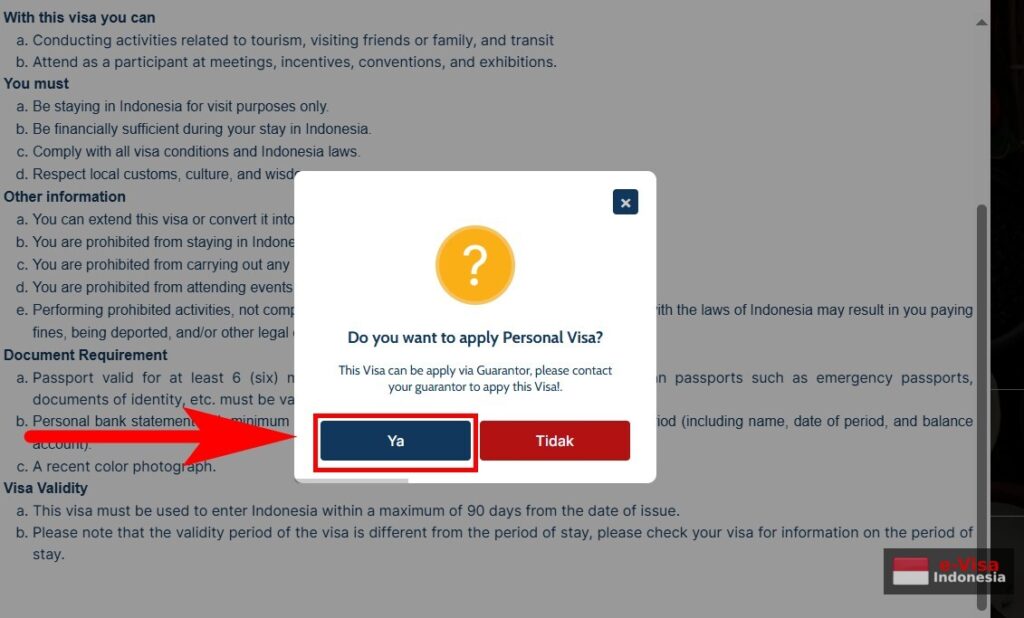
- Log in using your existing account credentials. If you don’t have an account, follow the steps to register a new one.
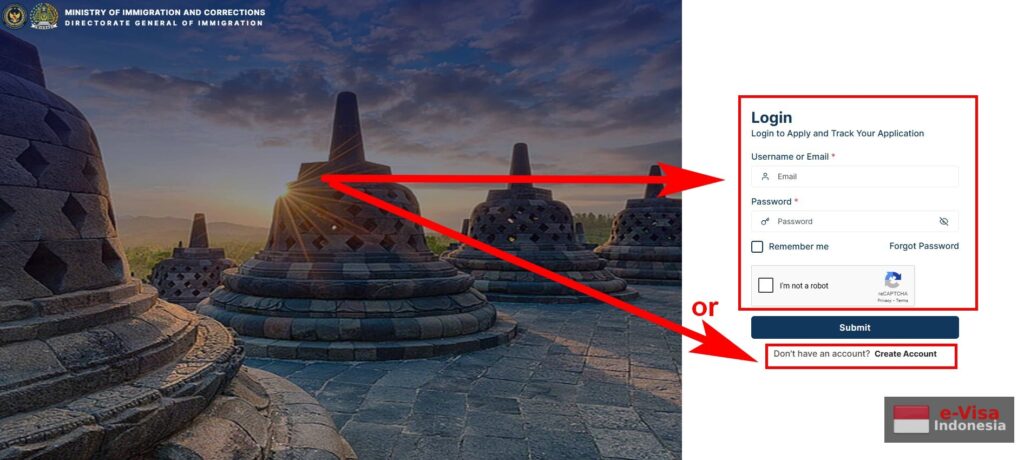
- If registering for a new account, make sure to select “Foreigner” as your user type to continue.
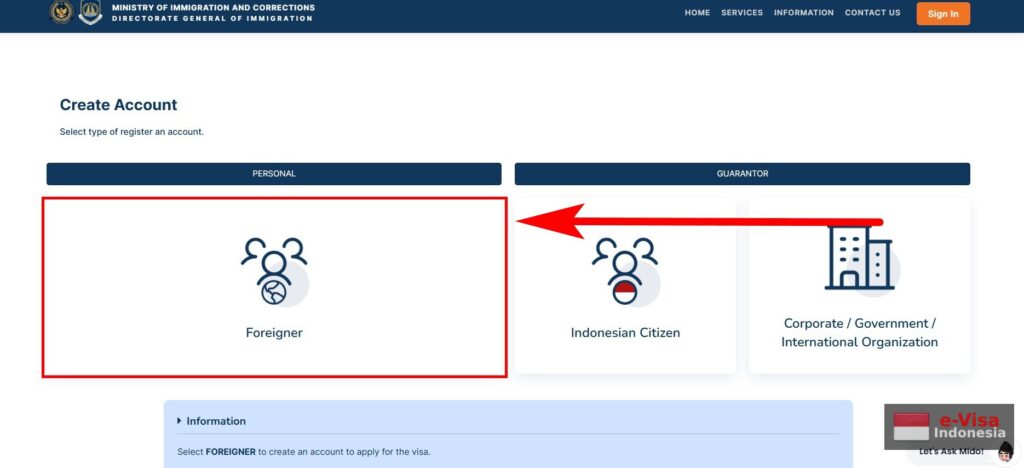
- Fill in your personal details accurately in the application form, then click “Submit” when complete.
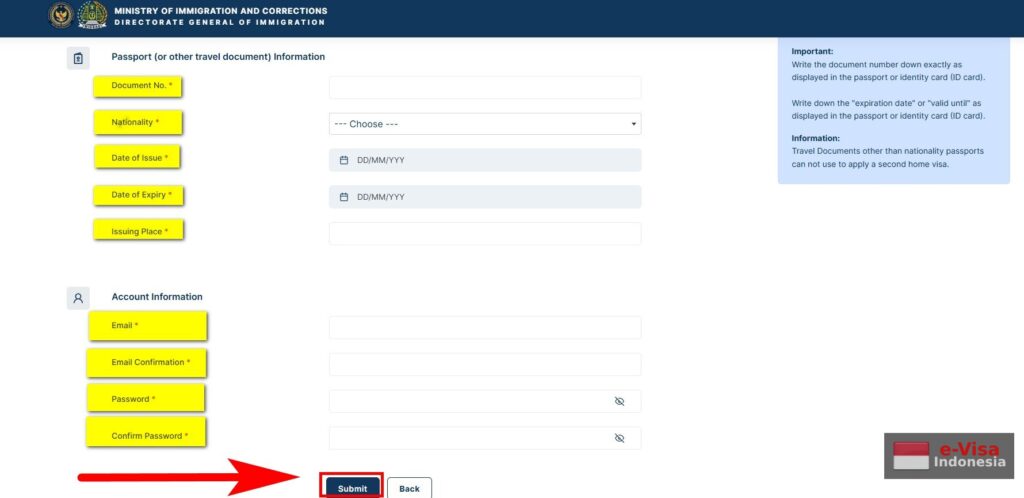
- Make your visa payment using a credit or debit card (Visa, Mastercard, or JCB). Ensure you complete the payment within 120 minutes, or your application will expire.
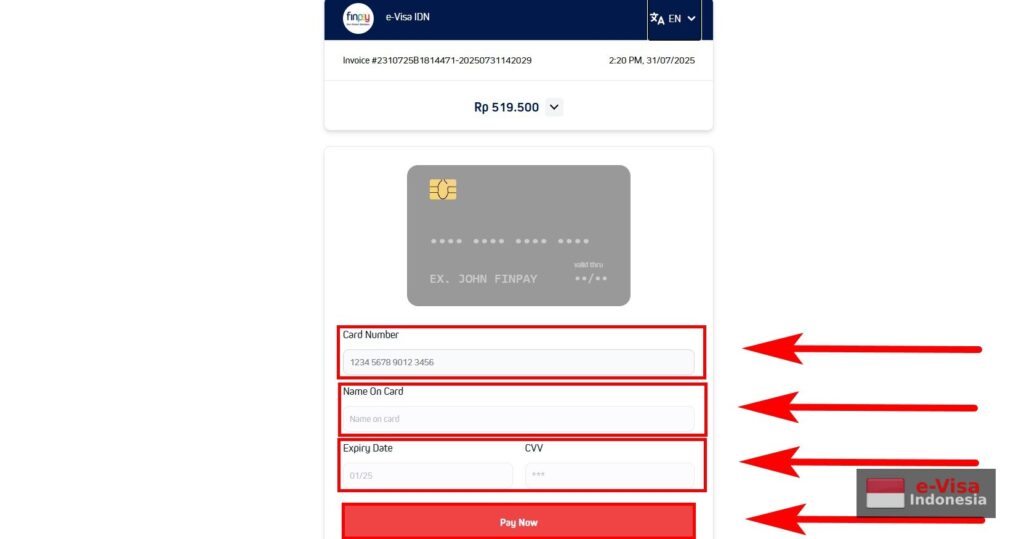
- Wait for your application to be processed. This typically takes up to 5 working days. You can log in to monitor your application status at any time.
- Once approved, download and print your eVisa. Be sure to carry a printed copy with you, as it will be required during immigration checks upon arrival.
Alternatively, if travelers from the United States get a VOA at Indonesian entry points, an immigration officer will attach the visa sticker to their passport and provide an electronic entry mark.
Processing Time
Visas on Arrival are processed almost immediately upon arrival at Indonesian entry points, where US citizens can complete the application and payment process at the VOA counter.
If applying online, the processing time is generally quick, depending on the volume of applications. This allows travelers to have their visa pre-approved before departure, ensuring a smoother entry process.
However, during peak travel seasons or if additional documentation is required, processing may take longer, so it’s advisable to apply well in advance of your travel date.
Stay, Validity, and Extensions
For short-term visits, the Visa on Arrival (VOA) allows an initial stay of up to 30 days, which can be extended once for an additional 30 days.
For longer stays, other visa types provide more flexibility, usually being extendable multiple times.
This extension process may vary — eVisas can typically be extended through official digital platforms, while VOAs require a visit to a local immigration office within Indonesia.
It’s important for US nationals to note that visas come with a specific validity period, meaning they must be used for entry into Indonesia within a given timeframe from the date of approval.
Indonesia Entry Requirements for US Nationals
When entering Indonesia, US nationals are required to have a passport with at least 6 months of validity remaining beyond their arrival date and a minimum of 2 blank pages.
Completing the SATUSEHAT Health Pass, an electronic self-declaration form, is mandatory prior to entry.
Visitors to Bali need to pay a tourist levy of 150,000 Indonesian Rupiah (around $10), which can be paid online or upon arrival. Those staying in private accommodations must register their stay at the nearest police station.
Travelers arriving from yellow fever risk areas are also required to present a valid vaccination certificate.
The Role of the Indonesian Embassy in the United States
For US passport holders, nearly all Indonesian visas can now be conveniently obtained online, removing the need for routine in-person visits to the diplomatic mission.
However, the Indonesian Embassy in the United States still plays an important role in certain situations.
If you encounter complex issues with your visa — such as problems with your online application or cases involving lengthy or specialized stays — the embassy can offer guidance and support.
- Address: 2020 Massachusetts Avenue NW, Washington, D.C. 20036
- Phone: +1 (202) 775 5200
- Email: washington.kbri@kemlu.go.id
Frequently Asked Questions (FAQs) about Indonesian Visas
- Do US citizens need a visa to visit Indonesia?
Yes, US nationals need a visa to enter Indonesia. The type of visa required depends on the purpose and duration of the visit.
- Can I get a Visa on Arrival (VOA)?
US citizens traveling for short-term visits, such as tourism or business meetings, can apply for a Visa on Arrival (VOA), which allows a stay of up to 30 days.
- Are there any entry requirements apart from obtaining a visa?
Yes, US travelers must complete the SATUSEHAT Health Pass, show proof of vaccination if arriving from yellow fever risk areas, and pay the Bali tourist levy. Those staying in private accommodations must also register their stay with the nearest police station.
- Can visas be extended while in Indonesia?
The VOA can be extended once at a local immigration office. Other visa types can also be prolonged, often through Indonesia’s official eVisa platform.
- Where can US citizens seek assistance with visa-related issues?
If US citizens encounter issues with their visa application, the Indonesian Embassy in the United States can provide guidance and support.
Conclusion
With a range of visa options available, from short-term leisure to employment or residency, US travelers can select the type that best suits their purpose and duration of stay in Indonesia.
Applying online through Indonesia’s official eVisa system simplifies the process, while VOAs also offer flexibility for last-minute plans.
However, it is essential to stay informed about the latest immigration policies and ensure all travel documents, including passports and health declarations, are in order prior to departure.
Sources
Hi, I’m Kartini Sisingamaraja! I’m an Indonesian travel blogger and a migration and visa expert with years of experience, including working for Indonesia’s Ministry of Immigration and Corrections. Traveling is my passion, and I love sharing my adventures, tips, and insights to help others explore the world with ease. Whether you’re looking for hidden gems in Indonesia or need guidance on visas and migration, I’m here to make your journey smoother and more exciting. Let’s explore together!

